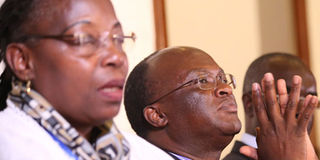WHO warns Kenya of Ebola spread risk

Health Cabinet Secretary James Macharia (centre), World Health Organization country representative Custodia Mandlhate (left) and incoming Kenya Airways Managing Director Mbuvi Ngunze addressing the press on the country's preparedness on handling the Ebola outbreak and control at a Nairobi hotel on August 13, 2014. PHOTO | BILLY MUTAI |
What you need to know:
- Ebola, now officially referred to as Ebola Virus Disease, has since March killed more than 1,000 people in Sierra Leone, Liberia, Guinea and Nigeria.
- The WHO has classified the four West African countries reeling from the Ebola outbreak in Category 1 (highest risk) and Kenya and the rest of African countries in Category 2 (high risk) and the rest of the World in category 3.
- Kenya Airways flies 44 times a week to 10 West African cities, including Freetown in Sierra Leone, Monrovia in Liberia and Lagos in Nigeria.
Kenya has been classified as a high-risk country as the government Wednesday pledged to increase efforts to keep Ebola away from the country.
The World Health Organisation (WHO) certified Kenya as a high-risk country as complaints built up that the government response to the virus had been tepid and casual.
There is no cure for Ebola, which kills most of its victims.
Ebola, now officially referred to as Ebola Virus Disease, has since March killed more than 1,000 people in Sierra Leone, Liberia, Guinea and Nigeria.
Kenya Airways has direct flights to the four countries and it said that it would announce Thursday whether it would review its flight schedule.
Earlier, the airline said it would act on the advice of the government or international agencies.
HEAVY TRAFFIC FLOW
Health Cabinet Secretary James Macharia, speaking at a meeting of a multi-agency government task force on Ebola, said the categorisation of Kenya as a high-risk area by the WHO was due to the heavy human traffic flow — mainly through flight connectivity — between Kenya and the four West African countries, where 1,884 people are infected with Ebola.
“Currently, Kenya receives more than 76 flights from Guinea, Liberia, Sierra Leone and Nigeria — on a weekly basis, which are mainly operated by Kenya Airways, Ethiopian Airlines and RwandAir.
“There is need, therefore, for enhanced preparedness for prevention of the Ebola virus into the country, including early detection and response,” Mr Macharia said.
He noted that 60 per cent of the passengers from the West African countries were usually in transit at JKIA to other destinations.
SCREEN PASSENGERS
The Cabinet secretary is understood to have briefed President Uhuru Kenyatta on the threat posed by Ebola at State House in Nairobi.
The WHO has classified the four West African countries reeling from the Ebola outbreak in Category 1 (highest risk) and Kenya and the rest of African countries in Category 2 (high risk) and the rest of the World in category 3.
WHO representative in Kenya Custodia Mandhate said Kenya was classified as level 2, which means a high-risk area for the transmission category.
Dr Mandhate, while commending efforts by the Ministry of Health to screen passengers jetting into the country from Ebola-hit countries, called for additional measures to prevent the virus from spreading.
FATE OF KQ FLIGHTS
“Safety measures are critical and have to involve all relevant sectors,” she said during the same press briefing.
KQ’s incoming chief executive, Mbuvi Nguze, who was also present, said the national carrier would take advice from the government and WHO on the fate of flights to the West African circuit.
“We continue to appraise evolving situations and the guidance we receive. KQ has put safety measures ever since the first outbreak was confirmed in March. But we don’t do this in isolation. We consult the government and the World Health Organisation (and) we are also constantly in touch with (the) International Air Transport Association, which is our world governing body,” he said.
STAKEHOLDERS' SENTIMENTS
Later, outgoing Kenya Airways chief executive Titus Naikuni said even though none of the institutions had advised against continued flights, the national carrier would make an announcement over the Ebola-hit region.
He said: “While none of these institutions have strongly advised that air flights should cease, Kenya Airways has religiously followed the counsel given as measures over risks associated with flying to the affected areas.”
His said the management was aware of the sentiments of other stakeholders and is taking them into consideration in the review process. Mr Naikuni added that Kenya Airways would make a statement on the future of its flights to the Ebola-hit countries.
SOURCE OF REVENUE
Kenya Airways flies 44 times a week to 10 West African cities, including Freetown in Sierra Leone, Monrovia in Liberia and Lagos in Nigeria.
The other destinations are Cotonou in Benin, Accra in Ghana, Dakar (Senegal), Yaoundé and Douala (Cameroon), Bamako (Mali) and Abidjan in Cote d’Ivoire.
The West African route is an important source of revenue for the airline.
At the same time, Parliament’s Human Rights caucus asked Kenya Airways to suspend flights to prevent the virus from getting into the country.
On Wednesday, Mr Macharia outlined the measures his ministry was taking to prevent Ebola in the country.
'HOLDING ROOMS'
They include the establishment of “temporary holding rooms” at JKIA where suspected cases of the disease would be retained and assessed further while awaiting possible transfer to isolation facilities at Kenyatta National Hospital and Mbagathi District Hospital in Nairobi.
Mr Macharia said the ministry required Sh530 million for the preventive measures. The funds will be drawn from the consolidated fund.
Those also at the briefing at a Nairobi hotel were Health PS Fred Segor, Director of Medical Services Nicholas Muraguri, Kenya Airports Authority managing director Lucy Mbugua and Kenya Medical Research Institute director Solomon Mpoke.
Reports by Mike Mwaniki, Aggrey Mutambo and John Njagi.




